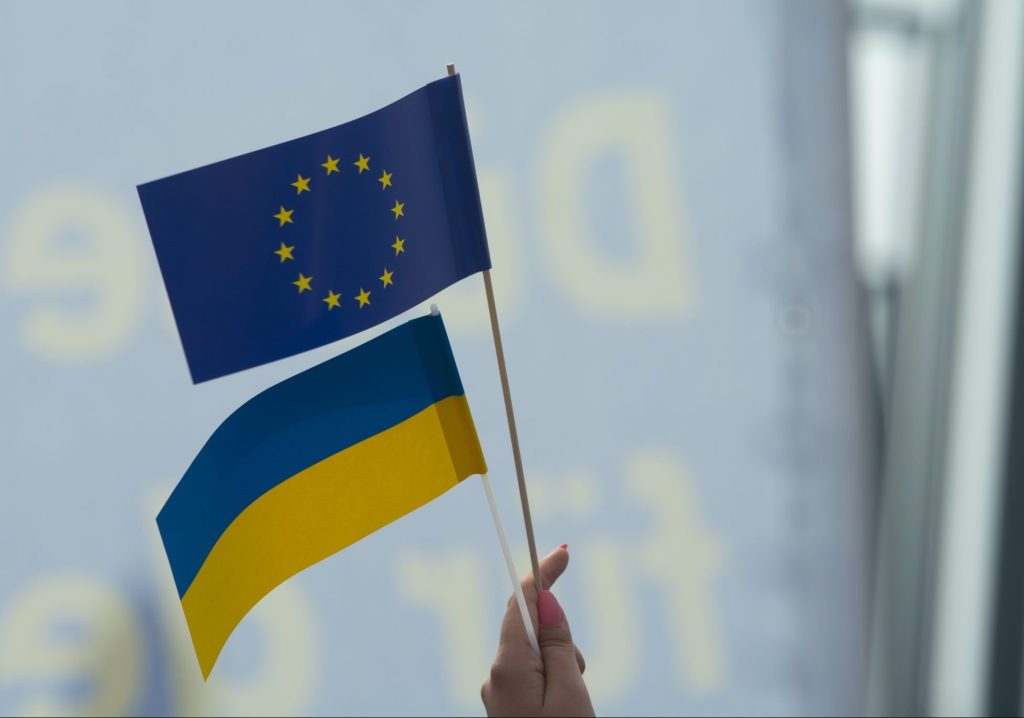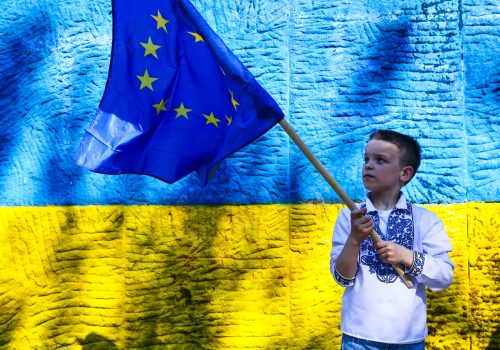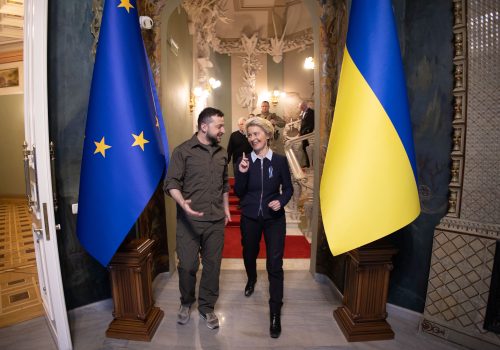Ukraine’s European integration aspirations will be high on the agenda at the forthcoming European Council meeting in Brussels on June 23-24. European leaders are expected to officially grant Ukraine EU candidate nation status at the summit, marking what would be a new stage in the country’s long journey toward closer ties with the 27-country bloc.
Recognition of Ukraine as a candidate country would not guarantee future EU membership. Indeed, Ukraine would become one of a number of countries with the same candidate status. Nevertheless, it would represent a significant breakthrough for Kyiv at a time when Ukrainians are defending their country against Russian invasion in a conflict driven in large part by Kremlin opposition to Ukraine’s European ambitions.
The war launched by Vladimir Putin on February 24 marks a major escalation in an ongoing eight-year campaign of Russian military aggression against Ukraine. One of the key factors driving the conflict is the Russian dictator’s alarm over Ukrainian attempts to turn away from Moscow and integrate into the Euro-Atlantic community of nations.
Putin believes the emergence of a European Ukraine would spark demands for similar change within Russia itself and serve as a catalyst for the next stage in Russia’s slow but steady imperial decline. As the current invasion demonstrates, he is prepared to go to almost any lengths to prevent the loss of Ukraine.
Ukrainians overwhelmingly support EU integration and expect to receive good news from this week’s summit. At the same time, there are no illusions over the likelihood of a fast track to membership. The Atlantic Council asked a range of experts what they think EU candidate nation status would mean for Ukraine.
Miriam Kosmehl, Senior Expert Eastern Europe, Bertelsmann Stiftung, Germany: Ukrainians would be rightly encouraged by EU candidate status. This step is needed to revitalize reform efforts and impact political decision-making within the Ukrainian government.
The progress Ukraine has made in EU integration under the Association Agreement since 2014 gives it an excellent start because all aspects of the enlargement process feature in Ukraine’s existing commitments within the Association Agreement.
At the same time, significant rule of law and corruption challenges remain. The five bodies of the anti-corruption ecosystem established after Ukraine’s 2014 Revolution of Dignity have demonstrated an ability to target corruption effectively, but they have themselves been targeted by older structures in the judiciary, the public prosecutor’s office, and the security services.
Ukrainian society is currently mobilizing tremendous resources to resist Russian aggression. It can be hoped that EU candidate nation status would help civil society to shape the political agenda, much as it did in 2014. Anti-corruption institutions remain institutionally intact despite the war but have been forced to scale down their activities. They must continue to work and receive full backing from the authorities.
Stay updated
As the world watches the Russian invasion of Ukraine unfold, UkraineAlert delivers the best Atlantic Council expert insight and analysis on Ukraine twice a week directly to your inbox.
Vitaly Sych, Chief Editor, NV media house: There are a number of reasons why official EU recognition of Ukraine’s European aspirations is extremely important right now. The first reason is emotional. Ukrainians need encouraging news and a glimpse of hope in these painful times. EU candidate status would definitely qualify.
Secondly, it is a great chance to modernize the country. Accession to the EU comes with a long list of conditions that will require Kyiv to make major progress in different areas from judicial reform to personal freedoms and business regulations. The government will come under huge pressure from the Ukrainian media, civil society, and Western partners to carry out these reforms. This can help Ukraine make rapid progress, much as the push for visa-free EU travel a few years ago made it possible to adopt dozens of reforms that might otherwise not have been implemented.
Candidate status would also bring financial advantages. It would send a strong signal to the whole world that Ukraine is an attractive investment opportunity offering the possibility of strong future growth.
Ultimately, receiving EU candidate status would represent a significant milestone in Ukraine’s efforts to finally kiss goodbye to the Soviet legacy and rejoin the European family of nations. At the end of the day, that is what the current war is all about.
Olena Halushka, Co-founder, International Center for Ukrainian Victory: Granting EU candidate status to Ukraine would be a powerful symbolic step that would also have tangible practical implications for the country.
First and foremost, candidate status would represent well-deserved recognition for Ukraine’s reform progress since 2014. It would send a signal of support and boost the morale of Ukraine’s frontline defenders and those currently living in Russian-occupied regions of the country. It would also convey a powerful message to Russian President Vladimir Putin that Ukraine is part of the EU family and will one day become a full member of the European Union.
Candidate status will bring with it a roadmap of reforms that will serve as powerful leverage for civil society to maintain the momentum of Ukraine’s reformist agenda. The list which was offered by the European Commission includes some important measures which are already priorities of my organization, the Anti-Corruption Action Center. This includes reforming the High Council of Justice and the High Qualification Commission of Judges along with the Constitutional Court of Ukraine.
Eurasia Center events

Taras Kuzio, Research Fellow, Henry Jackson Society: By granting Ukraine EU candidate status, the EU can push back against Russian aggression and longstanding Kremlin opposition to Ukraine’s European integration. Russia first began opposing EU enlargement after the Eastern Partnership initiative was launched in 2009. From that point onward, Russia began to regard the EU in the same hostile manner as it had traditionally viewed NATO.
Crucially, candidate status would take Ukraine out of the geopolitical grey zone between Eurasia and Europe. It would set Ukraine firmly on a European path leading away from Moscow and the Eurasian Economic Union project which Putin had sought to build around a core of Russia, Belarus and Ukraine.
Candidate status would be both a reflection of Ukraine’s reform progress since 2014 and deserved recognition for Ukraine’s determination to defend its sovereignty and European aspirations. Ukrainians first paid in blood for their European choice during the country’s Euromaidan Revolution and are now doing so against Russian forces in what is Europe’s largest conflict since WWII.
Andy Hunder, President, American Chamber of Commerce in Ukraine: The message behind EU candidate status is clear: Ukraine is coming home. Ukraine is returning to the European family of nations whose values it shares, and is moving away from the yoke of Russia’s vicious stranglehold.
EU candidate status will launch a new trajectory of GDP growth while providing a massive morale boost for post-war economic transformation and reform implementation. Such a move sends a positive message to investors that Ukraine is moving on the right track. There is no future for clean business in Russia. Instead, companies will look at Ukraine as a prime destination for post-war investment.
If Ukraine is granted EU candidate nation status, the country will undoubtedly put maximum effort into carrying out all the necessary reforms in the shortest possible time such as implementing real and effective judicial reform, rule of law, fair justice, and establishing a level playing field for the business community. We will see a comprehensive approach to creating a robust state and competitive economy.
Oleksiy Goncharenko, Ukrainian MP, European Solidarity party: For Ukraine, the decision to grant European Union candidate status would be much more than a mere technical formality. It would demonstrate that Europe stands with Ukraine and refuses to submit to Russian blackmail. It would represent the ultimate answer to the simple question of whether Ukraine has a future beyond the current devastating war.
Candidate status would also provide important new impetus for reforms in the country. This potential to drive reforms is evident from the fruitful experience of other European countries that have already passed through the candidate phase toward eventual EU membership. Meanwhile, Ukraine could expect positive economic consequences from candidate status due to the gradual impact of reforms and increased investor confidence in the future of the country.
Peter Dickinson is Editor of the Atlantic Council’s UkraineAlert Service.
Further reading
The views expressed in UkraineAlert are solely those of the authors and do not necessarily reflect the views of the Atlantic Council, its staff, or its supporters.

The Eurasia Center’s mission is to enhance transatlantic cooperation in promoting stability, democratic values and prosperity in Eurasia, from Eastern Europe and Turkey in the West to the Caucasus, Russia and Central Asia in the East.
Follow us on social media
and support our work
Image: A rally in support of Ukraine's EU candidate status. (Photo by Ying Tang/NurPhoto)




